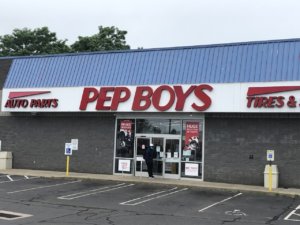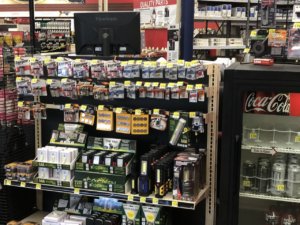I brought my car in to the Pep Boys for new tires and an oil change. When I saw the familiar cartoon figurines of the Pep Boys throughout the store, I remembered the childhood commercials: “We’re the Pep Boys—Manny, Moe and Jack!” Who were these guys? For starters, there were four—not three– “Pep Boys”-two just happened to have the same name, Moe.
Perhaps surprisingly, they were four Jewish boys from Philadelphia, whose success may have been the ultimate “in your face” for their contemporary, Henry Ford. Let me explain.
It is pretty well established that Henry Ford was anti-Semitic. As recounted in MyJewishLearning and countless other places, Ford came to believe in a Jewish world conspiracy. He blamed Jewish financiers for fomenting World War I, he suspected Jewish automobile dealers of conspiring to undermine Ford Company sales policies, and he vented his beliefs about Jewish power public in the pages of the Dearborn Independent. The “Pep Boys” managed to use the success of the Model T and Ford’s cars to their advantage. The four Navy buddies quickly realized that cars would be here to stay and would forever need parts and accessories.
According to the story in the Pep Boys website, the original “Pep Boys” were Emmanuel “Manny” Rosenfeld, Maurice “Moe” Strauss, Graham “Jack” Jackson, and Moe Radavitz, four friends who, in August 1921, reportedly chipped in $200 apiece to open a single auto parts store, which they rented at 7-11 North 63rd Street in West Philadelphia.
The store initially did not have a catchy name. As the story goes, Moe’s eye fell on a carton of Pep Valve Grinding compound. The store was therefore called Pep. Pep Auto Supply Company for its first two years. Local police officers encouraged people to visit “the boys at Pep.” There were several steps in the process leading to the ultimate name. Moe Radavitz and Jack Jackson eventually left the business and Moe Strauss’ brother eventually took on the role of Jack.
The guys continued to expand, even during the Great Depression. In addition to car accessories, the. Pep Boys also sold non-auto accessories including radio supplies and bicycles. The began to expand in California, and the company’s first service bays opened their doors in Los Angeles since stores were larger in square footage out west.
Pep Boys went public in 1945 and the business continued to grow. They had 124 stores by 1969, moved to the New York Stock Exchange in 1982 and eventually grew in the late 1980s to 700 stores, with almost 3,600 service bays and more than $2 billion in annual sales. As of 2016, Pep boys is owned by Icahn Automotive Group LLC, which was formed by its parent, Icahn Enterprises.
Today Pep Boys provides service for more than six million cars and car owners each year. Today the company operates more than 7,400 service bays in nearly 800 stores nationwide, and they are staffed by almost 20,000 friendly and knowledgeable.
I spent the past two days dealing with customer service agent, Brandon, an agent named Alexa who liked my reflective yellow bike shirt and called me “Hon,” and a bunch of mechanics who put on new tires, changed the oil AND installed a new oil pan. To kill time, I browsed the aisles—wearing a mask, of course. They had every car part and accessory imaginable, including key chains with tons of names (not Howard, unfortunately), candy bars and soda, batteries, bike and roof racks, phone chargers, and more. As I stared at photos of the Pep Boys in a Model T, I felt incredibly proud. Henry Ford and his anti-Semitism are things of the past. The Pep Boys still live on!







